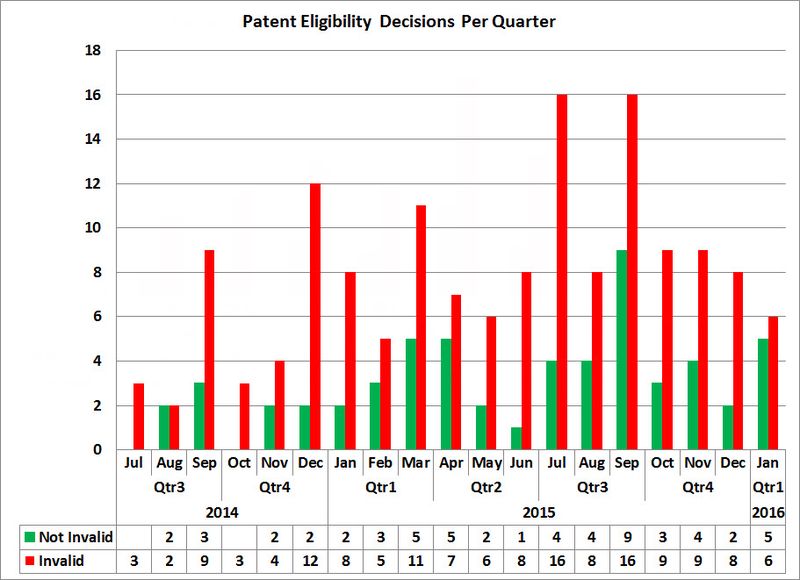

Credit: Bilski Blog
"The US patent system (or Congress) needs to reconsider whether software patents should be issued at all."Bilski Blog calls/dubs "AliceStorm" the phenomenon of patent squashing after Alice (2014). A lot of these are software patents, which are abstract. Looking at some of the latest posts about this [1, 2, 3] (the last one was cited here before), we now have the chart at the top. It shows that most of the time, by a large margin, Alice successfully buries software patents. The USPTO needs to heed the warning from courts (not just the Supreme Court but dozens more). The US patent system (or Congress) needs to reconsider whether software patents should be issued at all.
The country’s two most popular phone makers, Apple AAPL and Samsung, are still getting smacked by dozens of lawsuits from so-called “patent trolls,” which are shell companies that make no products.
Meanwhile, a single district in Texas, which the late Justice Antonin Scalia once branded a “renegade jurisdiction,” continues to occupy an outsize role in this ongoing patent pileup.
Those are two of the most notable takeaways that can be found in a new report on U.S. patent trends in 2015. Published by patent analytics firm Lex Machina, the report adds new grist to a debate over U.S. innovation policy at a time when patent reform in Congress has foundered once again.
"With Alice still fresh in people's mind (although apparently forgotten by some Justices, based on newly-circulated rumours), Apple is likely to lose.""Blame Texas for the latest patent pile-up falling on Apple and Samsung," says this person, cited by Florian Müller who added this Friday watchlist alert. Müller wrote: "Earlier this month (on Friday, March 4), the Supreme Court of the United States already had Samsung's December 2015 petition for writ of certiorari (request for Supreme Court review) in Apple's design patents case on its agenda. It's nothing unusual for a case to be relisted, and it happened in this case. There was no weekly conference last Friday, so this cert petition will be discussed this week, and we'll know the decision (unless there's another relisting) on Monday morning."
It is possible that SCOTUS will deal with at least one case that Apple brought against Samsung. With Alice still fresh in people's mind (although apparently forgotten by some Justices, based on newly-circulated rumours), Apple is likely to lose.
"Nobody wins except the lawyers. These cases drag on for ages."There is a lot more coverage about it this week [1, 2, 3, 4, 5, 6] and it comes to show just what a sordid mess patent wars have become. Nobody wins except the lawyers. These cases drag on for ages.
"If patents are about common good rather than protectionism for a few, then China should follow the will of its people, not of its patent lawyers (whose clients are often foreign)."Notice how far patents can go; even “sale of services”, not just manufacturing or sale of manufactured goods. How far can this go? Western patents, as this article from MIP suggests, can also be imposed on manufacturing giants/superpowers such as China. Why would China even entertain this? It's not in the interests of China, that's for sure, as most companies already manufacture everything in China. They hardly have a choice. "In determining the scope of patent protection in China," MIP wrote, "the question of support for the claims has come into focus, particularly for bio-medical inventions. Wenhui Zhang and Stephen Zou review some recent decisions" (from China).
As we noted in relation to India the other day, patents on medicine are in no way beneficial to the interests of a large population such as China's. If patents are about common good rather than protectionism for a few, then China should follow the will of its people, not of its patent lawyers (whose clients are often foreign). ⬆